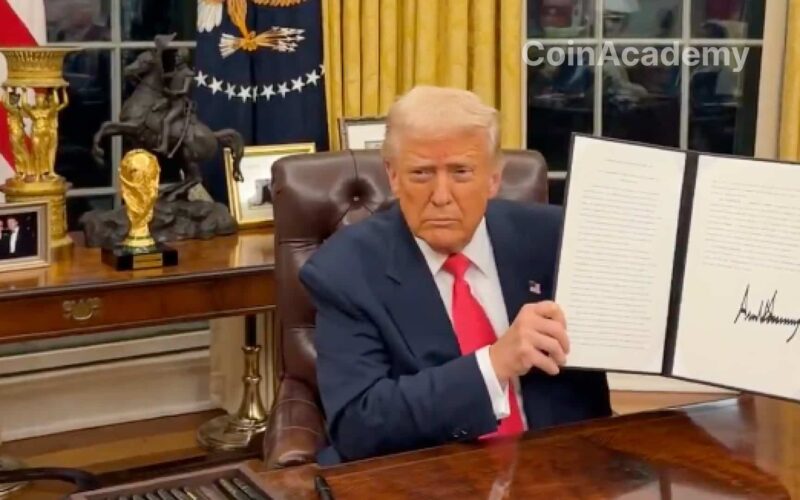Trump Signs Decree Establishing National Bitcoin Reserve
Donald Trump has signed a decree establishing a national Bitcoin reserve, storing the BTC seized by the government without further public purchase for now, currently totaling 198,000 BTC.
The announcement caused a 5% drop in Bitcoin and 4 to 8% drop in other cryptocurrencies, but could reduce selling pressure and limit long-term volatility. Bitcoin has since rebounded above $90,000.
This strategic decision legitimizes Bitcoin as a national reserve asset and could encourage other countries to adopt a similar approach amidst geopolitical challenges.
A Strategic Reserve of Bitcoin Fueled by Judicial Seizures
Donald Trump has signed a decree ordering the creation of a strategic Bitcoin reserve to store BTC seized by the US government in civil and criminal proceedings. This initiative, which does not involve direct purchase of Bitcoin with public funds, aims to transform these assets into a ‘digital Fort Knox’ for long-term preservation. Currently, the government holds about 198,000 BTC valued at $17.3 billion.
In parallel, a stockpile of digital assets has also been set up to gather other seized cryptocurrencies (SOL, ADA, and XRP were mentioned by the president). However, none of them will be included in the strategic reserve, which remains exclusively dedicated to Bitcoin.
An Immediate Impact on the Market
The announcement of the decree had a direct impact on the cryptocurrency market. Without any new acquisitions by the government, investors were disappointed, resulting in a 5% drop in Bitcoin, which briefly fell to $85,000 before rebounding. Ethereum (ETH), Ripple (XRP), Cardano (ADA), and Solana (SOL) also dropped 4 to 8%.
However, some experts believe that this decision reduces selling pressure in the market. By holding onto these BTC instead of liquidating them, the government removes billions of potentially sellable dollars worth of Bitcoin, which could limit long-term volatility.
A Complete Audit of Federal Digital Assets Ordered
The presidential decree goes beyond the creation of a strategic Bitcoin reserve. It also orders a detailed assessment of the digital assets held by the US government. To date, the government holds about 198,000 BTC, but no official audit has been conducted to confirm the exact extent of these reserves. A significant portion of these bitcoins notably come from the 98,000 to 110,000 BTC seized from Bitfinex ready to be transferred.
A Stockpile of Other Cryptos, but No Direct Purchases
In addition to Bitcoin, the government has created a ‘stockpile of digital assets’ encompassing other seized cryptocurrencies such as Ethereum (ETH), Ripple (XRP), Cardano (ADA), and Solana (SOL). Unlike BTC, these assets will not be included in the strategic reserve, and their future remains uncertain. However, no new purchases of cryptocurrencies will be made, contributing to investor disappointment and the 4 to 8% price drop on these assets.
A Strategic and Symbolic Decision
This decree marks a turning point for Bitcoin in the United States. Previously seen as a speculative asset, it is now considered a strategic reserve component by the world’s leading power. This recognition could inspire other nations to follow the American example. Michael Saylor, a staunch Bitcoin advocate, praises the initiative and is already proposing strategies to increase this national reserve.
Nathan McCauley, CEO of Anchorage Digital, sees this announcement as a strong message to global markets:
The establishment of a strategic Bitcoin reserve is a pivotal moment for crypto and American leadership on the international stage.
Jeff Anderson, head of STS Digital, highlights that this initiative ‘legitimizes the asset for still hesitant institutional investors.’
A Global Impact on Regulation and State Strategies
This decision could inspire other G20 nations to establish their own strategic Bitcoin reserves, according to Coinbase’s CEO. Some experts believe that this announcement could prompt countries like China or Russia to accelerate their initiatives to avoid letting the United States gain too much advantage on the subject.
A Cautious, Yet Promising Approach
Contrary to the expectations of some market players, the government does not foresee any immediate Bitcoin purchases. The Treasury and Commerce have been authorized to develop budget-neutral strategies to acquire additional BTC, without impacting the public deficit. Howard Lutnick, Secretary of Commerce and close to the crypto sector, could play a key role in this discreet accumulation.
While the strategy does not include direct purchases, it still sends a strong signal to financial institutions and other governments. The adoption of Bitcoin as a macroeconomic reserve could trigger a global movement of integrating cryptocurrencies into state treasuries and the balance sheets of large companies.




